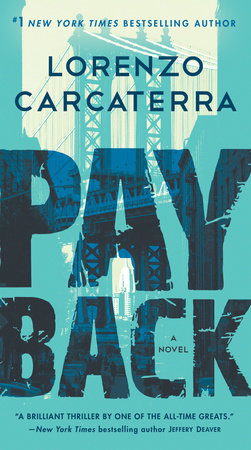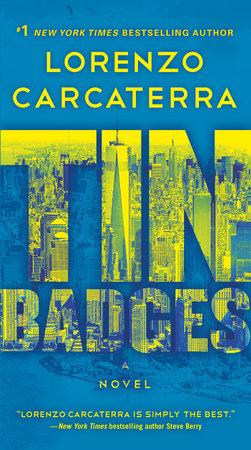Excerpt
Payback
1
Police Interrogation Room
November 2000
“Just tell the truth. That’s all you need to do. Once that’s done, then I’ll take care of the rest.” Detective First Grade Eddie Kenwood walked around the small, windowless room, hands deep inside the pockets of a pair of brown J. Crew slacks, his eyes on the frightened young man slumped against the table, its wooden edges frayed and worn.
“You’re only wasting time, Randy,” Kenwood said. “Mine and yours. Just tell me what I need to hear and we can both be on our way.”
Randy Jenkins rubbed his eyes and gazed up at Detective Kenwood. “I wasn’t there. I swear on my mama’s grave. I wasn’t there.”
“Save that my-mama’s-grave line of shit for somebody else,” Kenwood said. “Gangbanger like you should know better than to play that game with me. I don’t buy in to bullshit. Especially not from the likes of you. And especially when I got prints, your prints, on a knife I got tucked safe and sound in the evidence room. Now, are you going to f***in’ level with me or not?”
Eddie Kenwood was a highly decorated homicide detective with a long string of arrests attached to his impressive record. He closed his cases at a rapid pace and always delivered a signed-and-sealed confession. Most of the prosecutors working in the homicide division clamored to have one of Kenwood’s folders land on their desks, knowing it meant a slam-dunk conviction and a twenty-year sentence, along with a nod of approval from their boss.
Kenwood ridiculed detectives with lower conviction rates, cashing in on the traditional round of free drinks from the other members of the squad whenever he closed another file. He looked and dressed the part of the successful homicide detective—wearing neatly tailored suits or slick-catalog casual slacks and blazers. He was thirty-eight years old and had been on the force for sixteen years. He was tall and slender, ran five miles a day, usually on the streets of his Baldwin, Long Island, neighborhood. He kept his hair trimmed short and had his nails done once a week at a local salon two blocks from his precinct.
He was twice divorced, and both ex-wives had moved out of state once the marriage was over. He had no children and lived alone in a well-furnished two-story attached house on a quiet cul-de-sac. He didn’t associate with his neighbors and was a rabid hockey fan, never missing a New York Rangers game, either watching them play from the blue seats at the Garden or, when they were on the road, in his favorite bar. He planned to retire in four years, cash in his pension and full health benefits, and maybe move somewhere where he could count on sunshine every day. He was considered the very model of a professional working at the top of his game.
Randy Jenkins didn’t stand a chance locked in a room with Eddie Kenwood.
Jenkins was twenty-six and had a jacket with three prior convictions—two for assault and one for robbery. He had been out less than two months after completing a three-year spin at an upstate prison. He’d put doing time to good use—earning his GED and taking art classes. His mother had died three days after his sixth birthday and he had met his father twice, the last time at his funeral. He was raised by a grandmother who worked two full-time jobs until chronic back pain forced her to spend most days sitting in a La-Z-Boy in a cramped Harlem apartment.
Randy was short and tilted toward chubby. He had a sweet tooth and loved nothing better than a large cup of strawberry ice cream topped with Reese’s Pieces. His street friends would tease him about his weight.
“You hear about Randy?” one of them would ask.
“No, what?”
“He’s got himself TB.”
“Tuberculosis?”
“No, man. Three bellies.”
The nickname “TB” stuck, even as Randy put in a solid effort to slim down.
He ran with a tough crowd and hustled for money any way and anywhere he could. He was a mugger, a petty thief, a small-time drug dealer, and a car booster.
What he was not was a murderer.
He knew the victim. But he would never bring harm to her. He stared at her photo, resting faceup in the center of the small table. A woman whose mutilated body had been found less than a block from where Randy lived. A woman who had been seen on more than one occasion in Randy’s company.
“Say her name for me,” Kenwood said.
“I told you five times already, I know her name,” Randy said. “Rachel. Rachel Nieves. I knew her, no lie. But I didn’t kill her. And that’s no lie, either.”
“But you did kill her, Randy,” Kenwood said. He was hovering over the younger man, the sleeves of his crisp white shirt folded neatly up his forearms, his face flushed slightly red. “I know it and you know it. You took her into a shooting gallery, that’s a fact. There’s no denying that. I got two sets of eyeballs that will back me up. The two of you scored some smack, got a nice buzz going, and that’s when you made your move.”
“I didn’t hurt her,” Randy said, his voice breaking, sweat streaking the back of his brown T-shirt. “I would never hurt Rachel. She was my friend.”
“You carry a blade, don’t you, Randy?” Kenwood asked. “Don’t say no to me. Understand? Never say no to me. I got the knife, remember? And it’s got your prints on it. And your friend Rachel, she got sliced and diced by somebody who knows how to use a blade. To my eyes, that can only be you. Tell me I’m right about that, Randy. You want to get out of this room, don’t you? That’s easy. All you need to do is tell me the truth. Tell me it was you that killed Rachel Nieves.”
Randy shook his head, tears now mingled with sweat, streaming down the sides of his face. The heat in the room was unbearable, and it was hard for Randy to take a deep breath. Kenwood circled the room, and on every second turn he would slap his right hand on the wooden table, kicking up a dust cloud. He would occasionally bend down and glare at Randy, hover over him, their eyes locked. One set determined to get a confession. The other set overcome with fear.
“Time stops in this room, Randy,” Kenwood said, taking a break from his pacing, resting his back against a gray wall. “There are no days, no hours, no minutes, no seconds. There’s just you and there’s me. And there’s a murder that needs to be solved. A murder we both know is on you. That’s the only way out of this room, Randy. You need to tell me what I already know. What we both know. You need to tell me you killed Rachel Nieves. Then it will be over.”
Randy lifted his head and looked across the room at Kenwood. “I didn’t hurt her,” he said. His voice was barely above a whisper, and both his cheeks twitched in rapid spurts.
“You got it wrong, kid,” Kenwood said. He stepped away from the wall and moved menacingly toward Randy. “What you meant to say is you didn’t mean to hurt her. But you did hurt her. Maybe it was the drugs. Maybe it was because she told you she wasn’t interested in you anymore. Maybe it was both. You snapped. And you hurt her, Randy. You more than hurt her. You killed her. Look at that picture on the table. Take a good long look at it. That’s your work. That’s what you did to a young woman you call your friend.”
Randy turned away from Kenwood and stared down at the photo of a battered and beaten Rachel Nieves. “She was my friend,” was all he managed to say.
“That’s right,” Kenwood said, nodding in agreement. “She was. And now she’s dead. And she’s dead because of you. Because of her friend.”
“Can I get some water?” Randy asked. His words more a plea than a demand.
“As much as you want and as cold as you can take it,” Kenwood said. “Soon as we wrap up here. Soon as you tell me what it is I need to hear. I’ll even throw in a Big Mac and fries. It’s all there waiting for you. Believe me, Randy, I want out of this room much as you do. But neither one of us is going anywhere until you open up and start telling me the truth about what you did to Rachel.”
Kenwood left the room for a few minutes, as Randy Jenkins sat alone, frightened, shaking his head in disbelief, his mind now reduced to a jumble of rambling thoughts. He knew he wasn’t a murderer. He had his head down, drops of sweat running from his head to his face and onto the scarred table. He closed his eyes and tried in vain to figure a way out of the situation he found himself in.





